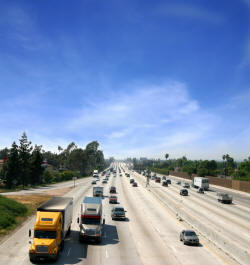System
changes for improved vehicle aerodynamics, drive train
improvements, accessory management and engine cylinder
management could reduce the amount of fuel used.Alternate fuels: blends, ultra low sulphur and GTL (gas
to liquid) help with costs. Substituting synthetic oil
and lubricants and other non petroleum based fluids may
reduce the amount of petroleum needed thereby
influencing cost/emissions. The service impact to
coolant content may require testing. |
 |
| The impact of
particulate traps in end user operations will need to be
evaluated. Service intervals and the relationship to
fuel and oil consumption needs to be determined.
Durability needs to be documented. Whether it’s
driving on the beach, down gravel roads, 2 or 4 lane
highways. city/urban, 6-9% grades, salt belt, or off
road, let RWT test your products in the real real world
customer applied environment. |

